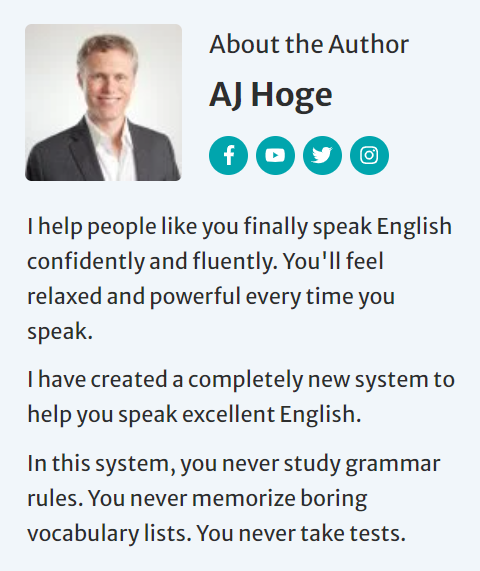Error correction is a controversial topic. A lot of people have strong emotions about it.
Most English teachers believe that error correction is necessary. In fact, they think it’s vital. Many students, who have been trained by their schools and teachers, also believe that they need to have their speaking errors constantly corrected.
My students, therefore, are a little confused when I tell them, “I will never correct your spoken errors”.
Some people get upset when I say this. Other English teachers get upset. They feel I am committing a sin– that I am committing English education heresy!
Some students even get upset. They beg me, “AJ, please correct my speaking errors”. I always say “no”.
Of course, traditional English classes love error correction. When a student speaks, the teacher will directly or indirectly focus on their mistakes. For example, a student stands up in class. She says, “Yesterday I had good time. I go to store and go shopping”.
At this moment, the student feels nervous because all of the class, and the teacher, are listening to her. But she also feels happy– she just spoke English. She just communicated information clearly in English.
But her happiness is soon destroyed by the teacher. If the teacher is nice, he will say, “OK. Yesterday you had A good time. You WENT to THE store and WENT shopping.”
If the teacher isn’t nice, he will say, “No. You need to say A good time… and you didn’t use the past tense. You’re talking about yesterday. What is the past tense of go“?
Either way, the student now feels foolish and stupid. She now thinks, “English is so difficult,… I’ll never be good at English”. Her motivation is destroyed.
But it’s even worse. Because error correction is TOTALLY ineffective. There have been many, many studies of spoken error correction. For example, they divide students into two groups. Group 1 has their mistakes corrected constantly, for 3 months, or 6 months, or 1 year. Group 2 never has their speaking errors corrected.
At the end of several months or years, they test each group. Surprisingly, there is still absolutely no difference in their speaking accuracy or errors. Each group still makes the same number and type of mistakes.
Correcting speaking errors is a waste of time… and it hurts the student. Error correction kills speaking speed and fluency. Every time a spoken error is corrected, the student stops, thinks, and analyzes English grammar.
Over time, their speech gets slower and slower. They think slowly and carefully about everything they say. They are paralyzed by the worry of making mistakes.
If you have a tutor, NEVER ask them to correct your spoken mistakes. Instead, focus on listening to correct English. The more you listen to correct English from native speakers, the more you automatically correct your own mistakes.
Your speech becomes more accurate AND faster.
So forget error correction. Don’t focus on the negative. Don’t focus on mistakes.
Focus on the positive. Focus on listening to a lot of real English from native speakers.
And when you speak… just relax and speak. Focus on communicating ideas, not on perfect grammar. With time, your spoken grammar will improve.
Listen to the Audio of this article:





